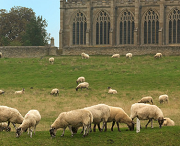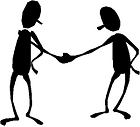We're at a stage in Seattle where it seems criminal not to take advantage of the year's first really nice weather. Of course, in a week, everyone will be complaining about how hot it is.
I have a couple of new-to-me terms today that are sort of related. They're also kind of wonkish, but we must take the wonkish along with the, um, fun? Anyway, the terms are privacy of the commons and collateral freedom.
Privacy of the commons is, to quote the FiveThirtyEight article where I learned the term, "when one person’s voluntary disclosure of personal information exposes the personal information of others who had no say in the matter." Their particular example concerns the recently apprehended Golden State killer, who was found not because of a match to his own DNA, but because of a match to the DNA of one of his relatives. A more mundane (tho not less scary) example they give is a young child whose life can be closely tracked via the parents' purchases at the grocery store, at the pharmacy, etc. Obviously, the child has no say-so in any of this tracking.
 As the article notes, the term is a play on tragedy of the commons, where something held communally is exploited individually, with a net loss to the community. (Privatized profit, socialized cost.) It's not clear to me whether the FiveThirtyEight folks invented the term; they do say "call it 'privacy of the commons'," and other references I find allude to this article. So perhaps we have ground zero for a new term.
As the article notes, the term is a play on tragedy of the commons, where something held communally is exploited individually, with a net loss to the community. (Privatized profit, socialized cost.) It's not clear to me whether the FiveThirtyEight folks invented the term; they do say "call it 'privacy of the commons'," and other references I find allude to this article. So perhaps we have ground zero for a new term.
The term collateral freedom describes the situation where an attempt to censor someone would affect so many people that it's impractical. As a not-great example, if you didn't want your kids to watch some particular program on Netflix, you might not want to block the entirety of Netflix. A more realistic albeit technical example is when someone runs content through Amazon or Google cloud services in such a way that it looks like the content is originating in those domains—a government censor probably doesn't want to censor amazon.com or google.com. (This is, or was, a technique known as domain fronting that was recently in the news.)
 The term collateral freedom seems to be used mostly in this relatively narrow technical way, but the concept is familiar: in order to allow broad freedom, we have to tolerate some things we perhaps would rather not. Or that's my read on the idea, anyway.
The term collateral freedom seems to be used mostly in this relatively narrow technical way, but the concept is familiar: in order to allow broad freedom, we have to tolerate some things we perhaps would rather not. Or that's my read on the idea, anyway.
Last week we explored the word druthers, a strangely plural term. (I guess I'm assuming that the -s is a plural marker, which might not be correct.) Today we have another word with a mysterious final -s: cahoots, like, "They were in cahoots." (Collusion, bwa-ha-ha.) This is an American word, specifically from the south and west, that starts showing up in the first half of the 19th century.
 Several surprises for me. First, a non-s-ending version is attested ("Hese in cohoot with me"), but that was in the word's earlier days. Second, although I think of "in cahoots with" as having sinister overtones, early attestations seem to be more neutral, just meaning "in partnership with." Third, there was a verbal version at one point ("They all agree to cahoot with their claims"), which surely is obsolete?
Several surprises for me. First, a non-s-ending version is attested ("Hese in cohoot with me"), but that was in the word's earlier days. Second, although I think of "in cahoots with" as having sinister overtones, early attestations seem to be more neutral, just meaning "in partnership with." Third, there was a verbal version at one point ("They all agree to cahoot with their claims"), which surely is obsolete?
Anyway, there are two proposed origins. One is that cahoots derives from cahute, a French word that seems to combine cabin and hut. The word cahute shows up in English as far back as the 1500s, hmm. The OED says that as an alternative origin, "American dictionaries" (unspecified) trace the word to the French word cohorte.
The French origin seems unsurprising, if we allow that the American south and west had more latter-day French influence than other parts of English. I like the picture of some confederates being under a cabin-hut roof together. The cohort explanation is slightly less colorful, even if it is just as sensible. But whatever the origins, we again don't know how the word picked up that terminal -s, dang it.
Like this? Read all the Friday words.
 |
|

 |
|
